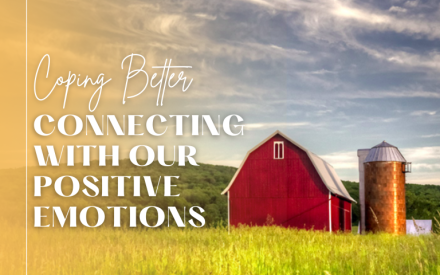🎧 Listen
Episode Summary:
Compassion is a powerful way we connect with others – but how often do we extend it to ourselves when we really need it? Not often enough. In this session we talk with Amanda Coorough, Health and Wellbeing Educator, University of Wisconsin – Madison, Division of Extension and Shawn Monson, Program Coordinator, Farmwell Wisconsin, a service of Southwest Wisconsin Community Action Program. They not only share with us why self compassion is so important to our well-being, but they provide examples of how self compassion can be a source of strength in very difficult times.
Transcript:
Ron Fruit: Welcome to the podcast, Coping Better, Connecting Our Positive Emotions, where we talk about positive emotion skills in relation to farm stress. Today we’ll be discussing self-compassion and acts of kindness in agriculture, one of the core skills of the WeCOPE series. I’m your host, Ron Fruit. Our guests today include Amanda Coorough, Health and Wellbeing Educator, UW Madison, Division of Extension, Sauk County, and Shawn Monson, Program Coordinator, Farmwell Wisconsin, a service of Southwest Wisconsin Community Action Program. Self-compassion is the act of being kind and understanding of one’s self. We often think about being compassionate toward others, but Amanda reminds us we can direct compassion toward ourselves.
Amanda Coorough: By doing that we learn to support ourselves through self encouragement rather than being punishing or condemning ourselves. That self-compassion really means that we’re patient, we’re kind, we’re non-judgmental with ourselves. It’s really that we recognize that we’re human and therefore we’re imperfect and we’re capable of making mistakes. What this does is that it gives us permission to take a supportive, caring attitude towards ourselves, and then it motivates us first to provide ourselves with comfort and then to respond in a more constructive way. When we punish or condemn ourselves, we tend to do the exact opposite of that, which is to kind of say, we belittle, we judge, we talk ourselves down, and then we often act in ways that are not constructive and that can look like anything. So it can be, you know, simply just getting ourselves locked into really bad decisions, and it can swing all the way to the opposite end of really engaging in really destructive behaviors. But the point here is that we act in ways that aren’t in our best interests when we punish and condemn.
Ron Fruit: Shawn believes self-compassion is about your own personal well-being.
Shawn Monson: Something that we always talk about is how a farmer’s the most important piece of the farm. A farmer’s not doing well, uh, their farm can likely hinder from that or is hurt by that. And so I would say soft compassion is giving yourself grace, giving yourself a break when needed, and being able to recognize that. Uh, it’s good to try to find some way to give yourself a break and a chance to recharge. I know I, I talked about my parents about this interview and my mom had said it. Her and dad had always tried to give themselves some time to do something they really enjoy. You know, my dad really enjoyed Wisconsin hockey and went to the, um, frozen four, he was lucky enough to get to go see them play on the East coast. That was his passion that helped recharge his batteries. And then he came back and worked hard on the farm, and my mom really enjoyed reading books. And so she’d be, you know, a nice day. She would take the time to read a book, not feel guilty about not doing something on the farm, and found that she had a lot more energy when she was back to work.
Ron Fruit: Saying to someone just practice self-compassion is much easier said than done.
Amanda Coorough: Some of those challenges that might come up when we think about practicing self-compassion may have to do with how we think others might view us. If, you know, we show ourselves kindness; or maybe just what was, or what has been considered, you know, quote unquote normal in and around us in our lives as we grew up and moved through our communities of influence. The good news is that we have that ability to, to challenge some of those viewpoints or maybe myths about self-compassion, and also the ability to then choose self-compassion as a healthier option once we see the truth of what it has to offer us as far as better health and well-being. So, for example, sometimes people think that self-compassion is related to self-pity and isolation, and that might show up as, you know, why does this always happen to me? The truth is that self-compassion acknowledges that human suffering is completely real and that none of us are alone.
Amanda Coorough: And that is a really powerful acknowledgement. It’s a life saving acknowledgement to be able to know that. Sometimes people think that it relates to weakness or being soft, when in truth, the strength required to keep a clear mind, see your own suffering, and not judge yourself for it, and then to give yourself kindness in the face of difficulty is immensely powerful. And sometimes as a society even we see self-compassion as just laziness or self-indulgence and that people won’t or can’t grow from it. But the truth is that people who use self-compassion show a far greater ability to get motivated to do better, to see growth and positive change because they aren’t undermining themselves from within; and I think about Shawn’s parents, you know, they, they are doing things that help them continue to get through their daily lives rather than, you know, Shawn’s mom’s not judging herself because she’s reading a book.
Amanda Coorough: She saw the value in that. I think the best statement I’ve ever heard when it comes to self-care and self-compassion is simply this; “If you don’t put yourself first, you won’t last.” And it hits me in my heart and soul every time. Whether you’re more visual and you need to think of your energy level like a phone battery or like a bucket of water or a cup in hand, it’s all the same. Empty is empty. Most of us would not let our phone battery die because we just couldn’t stand the vulnerability of being disconnected. Yet we deplete our own energy to that point daily and don’t even consider that level of vulnerability we leave ourselves in.
Ron Fruit: Shawn Monson’s work affords him the opportunity to read and learn about self-compassion in his own life.
Shawn Monson: I’ve really found that I struggled with to-do lists, so a lot of people to make sure you don’t forget something you put together to-do lists. And what I, uh, started to experience was this kind of like overwhelming feeling like I, I can’t get done with this list. You know, as your day goes on, you’re adding more stuff to it and it almost feels never ending. I was actually talking to a farmer on the phone and I had said, “Yeah, I started my morning. I had nine things in my to-do list and I’ve gotten stuff done today and I’ve got 13 now for tomorrow.” He left and he said, “You can’t let you know a to-do list define whether or not you had a good day. If you don’t get through that list, it doesn’t mean you had a bad day.” And I thought that was a really insightful thing that I had heard from him. And he said, “Don’t worry, that stuff will be there tomorrow too. He’s like, It doesn’t help to be hard on yourself.” And that, that was really a good lesson for me not to let some list define, you know, if I didn’t get done with something, it’s likely not the end of the world. You know, I got done with the things that need to be done with, and just because I have more on my list than I did when I started doesn’t mean it. I had a bad day.
Ron Fruit: Amanda Coorough says, it’s important to look at relationships and situations. That challenge our negative self-talk.
Amanda Coorough: I also really like to take the time to pair self-compassion with savoring. Um, so for example, when I feel really great about things I’m doing or people I’m with, take a moment and to savor the why. Um, and that really helps me to realize that it’s because I’m getting back as much as I get into those situations, rather than draining myself towards things that aren’t in my best interest. It’s how we retain our own personal power, um, towards self-compassion. We keep that battery or that bucket or that cup, whatever it is you visualize, um, as your energy source. Um, we keep it full, um, and we can keep giving to others.
Ron Fruit: Speaking of savoring, Shawn grew up on the farm. His parents savored simple but significant accomplishments. They
Shawn Monson: Both said that one of the most gratifying feelings that they always saved was when all, all the hay was up in our hay mow, you know, it was out of the field. Wasn’t, didn’t have to worry about getting rained on. We always did like a big meal. My cousins would come out and help us mow hay. It was like a really great gathering and it was such a relief, Oh, I’m so happy. I know I’m gonna have a mow two mows of, of hay over my head in the winter time, um, was such a relief for my parents. And so like finding those moments like that or, you know, as we were growing up on the farm, the older you get, the new chores you get to do and like we looked forward to it because you know, it’s more responsibility and we wanted to help our parents. Them seeing us grow was something that they enjoyed too and getting more independent, helpful on the farm. So there’s those moments every day that, you know, we have and taking a moment to step back and enjoy that it sounds like really did wonders for them. In terms of savoring,
Ron Fruit: Thanks to our guests, Amanda Coorough and Shawn Monson for sharing their knowledge and experiences with us. If you are interested in more information on positive emotional skills, check out all the episodes in Coping Better, Connecting our Positive Emotions.
Credits: Coping Better; Connecting with Our Positive Emotions is a product of a generous grant from the U.S. Department of Agriculture’s (USDA) National Institute for Food and Agriculture (NIFA) through a partnership with the Wisconsin Department of Agriculture, Trade and Consumer Protection (DATCP) and is adapted from the original WeCOPE curriculum, a ROTA grant funded program through the U.S. Substance Abuse and Mental Health Services Administration (SAMHSA).



